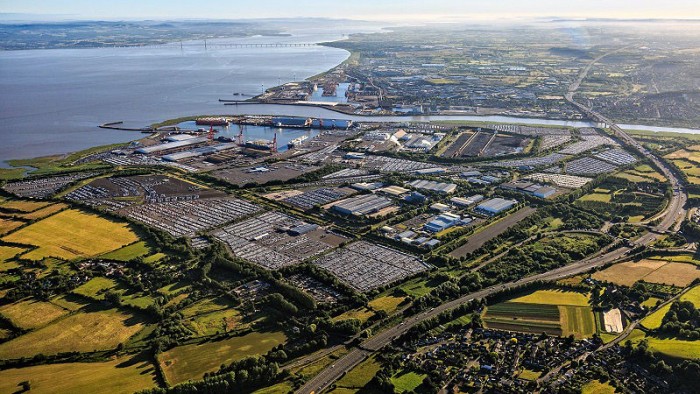The economic importance of Avonmouth

Bales of Spanish slate sit piled on the quayside; neat queues of JCBs are mustered on the tarmac; a mountain of woodchip – once IKEA kitchens – awaits loading on a vessel; and an enormous pipe channels orange juice from Brazil over our heads, part of the grandly named European Juice Terminal.
It’s easy to forget Bristol’s docks at Avonmouth and Portbury as they grey into the industrial fringe, but the punch they pack in the city’s economic landscape is unsung.
A 2014 report by Oxford Economics found that Bristol Port Company and businesses on the Port estate support an estimated £510 million to regional GDP, supporting 10,100 jobs in the South West alongside the 498 directly employed by the port itself. Thirteen million tonnes of cargo are processed every year; South African wines, Mitsubishi and Toyota cars, aluminium ingots, bales of paper, scrap metal, grains, animal feed – all manner of vital products.
Bristol’s fortunes historically grew from its importance on shipping routes, once the UK’s second port, but they waned in the 20th century as ships grew and found more navigable docks. However, as an island nation, the UK is still dependent on ports with a staggering 95 per cent of goods entering and leaving by sea. Bristol was and still is well placed to capture that trade, advantaged by our position at a crucial node where motorways and railway lines intersect.
“We’re the closest port to a major strategic network,” says John Chaplin, CEO of Bristol Port Company, which has managed the hub since 1991 and invested £500m on improving facilities. The wind turbines wheeling above can supply up to 75 per cent of energy. In 2001 the Portishead rail line closed by Beeching reopened as a cargo line.
Before, 90 per cent of cargo was inbound and 10 per cent outbound. Today, that figure stands at 70:30, the monetary value at 50:50 thanks to the export of high value goods such as JCBs and Landrovers. Freight traffic through the port has more than doubled since 1991, with ambitions for more growth. “The challenge is adding value,” says John as we tour the expansive 2,500-acre site; bottling drinks and changing car seats, for example.
Avonmouth’s industrial activities have grown alongside, a product of both the port and the infrastructure network that serves it. The M49, M4 and M5 make this the perfection site for south-west distribution hubs. Co-op, John Lewis, Farm Foods and Asda are just a few who have distribution centres here serving South Wales and everything down to Lands’ End; Waitrose is rumoured to be joining them. Major wholesale warehouses have chosen Avonmouth, Costco one of the better known, also boasting the cheapest petrol in Bristol.
Asda opened its new facility, on the site of a former chemical works, in September 2013 at a cost of £70m including the onsite recycling plant – all waste is reused or recycled. The low, almost windowless building alongside the arterial road, ringed by a security fence looks like a high-tech bunker but it conceals a slick, streamlined logistics operation. Three titanic warehouses check and process ambient, chilled and frozen food, neatly queuing trollies of food up in lanes. The freezer looks like a Pixar movie with staff wrapped up in balaclavas and thick layers buzzing around on fork lifts and picking trucks.
“We serve 70 shops, all the way down to the bottom of Cornwall, along to Andover, up to Worcester and right along the south of wales to Pembroke Dock,” says general manager Chris Tilly, revealing that they “do about 130,000 miles a week delivering to shops”. The team can process in excess of 1.3 million cases of food each day worth more than £10m.
Facilities like these are big employers too; 440 people work in the warehouse, alongside 180 drivers and 50 managers. An announcement by the Range that they will be locating their new distribution hub in Avonmouth will add another 1,000 jobs.
Though the port and logistics hub are flourishing, there have been setbacks. Consent has been in place for five years or more for the expansion of Bristol’s container port – currently processing around 100,000 containers, a comparatively small activity compared to the big container rivals such as Felixstowe – but that’s been on hold since the downturn. Chris illustrates the latent potential, pointing towards a crumbling pier at the edge of a large, gravelled patch of so-far-unused land.
But he’s optimistic: “One day this will be a good location.”
Chugging quietly, steadily along at the river mouth, one thing’s for sure – the city’s docks are one of Bristol’s vital economic organs.
Source: Bristol 24/7